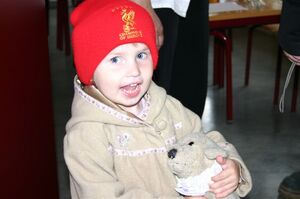No edit summary Tag: sourceedit |
No edit summary Tag: sourceedit |
||
| Line 5: | Line 5: | ||
People with echolalia repeat noises and phrases that they hear. They may not be able to communicate effectively because they struggle to express their own thoughts. For example, if asked a question, they might be able only to repeat the question rather than answer it. |
People with echolalia repeat noises and phrases that they hear. They may not be able to communicate effectively because they struggle to express their own thoughts. For example, if asked a question, they might be able only to repeat the question rather than answer it. |
||
| − | Cynthia Kim has written in detail about the uses of echolalia.<ref>http://musingsofanaspie.com/2013/09/18/echolalia-thats-what-she-said Musings of an Aspie] |
+ | Cynthia Kim has written in detail about the uses of echolalia.<ref>http://musingsofanaspie.com/2013/09/18/echolalia-thats-what-she-said Musings of an Aspie]</ref> |
==References== |
==References== |
||
Revision as of 13:23, 26 July 2016

Echolalia is the repetition of vocalizations made by another person. A 1983 report indicated that up to 75% of verbal people with autism have some form of echolalia.[1] Two major types of Echolalia have been identified: immediate echolalia and delayed echolalia.
People with echolalia repeat noises and phrases that they hear. They may not be able to communicate effectively because they struggle to express their own thoughts. For example, if asked a question, they might be able only to repeat the question rather than answer it.
Cynthia Kim has written in detail about the uses of echolalia.[2]
References
- ↑ Prizant, B.M. (1983). Echolalia of autistic individuals: Assessment and intervention issues. Seminars in Speech and Language, 4, 63-77. Summarized from Heffner, Gary J. Echolalia and Autism, The Autism Home Page: Echolalia Facts. July 2000. Retrieved 1 December 2006.
- ↑ http://musingsofanaspie.com/2013/09/18/echolalia-thats-what-she-said Musings of an Aspie]
Template:Wikipedia
